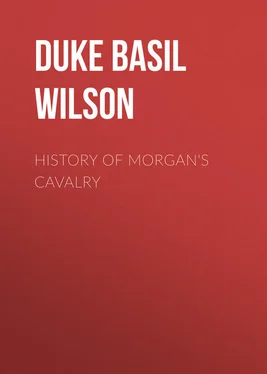Basil Duke - History of Morgan's Cavalry
Здесь есть возможность читать онлайн «Basil Duke - History of Morgan's Cavalry» — ознакомительный отрывок электронной книги совершенно бесплатно, а после прочтения отрывка купить полную версию. В некоторых случаях можно слушать аудио, скачать через торрент в формате fb2 и присутствует краткое содержание. Издательство: Иностранный паблик, Жанр: foreign_antique, foreign_prose, на английском языке. Описание произведения, (предисловие) а так же отзывы посетителей доступны на портале библиотеки ЛибКат.
- Название:History of Morgan's Cavalry
- Автор:
- Издательство:Иностранный паблик
- Жанр:
- Год:неизвестен
- ISBN:нет данных
- Рейтинг книги:3 / 5. Голосов: 1
-
Избранное:Добавить в избранное
- Отзывы:
-
Ваша оценка:
- 60
- 1
- 2
- 3
- 4
- 5
History of Morgan's Cavalry: краткое содержание, описание и аннотация
Предлагаем к чтению аннотацию, описание, краткое содержание или предисловие (зависит от того, что написал сам автор книги «History of Morgan's Cavalry»). Если вы не нашли необходимую информацию о книге — напишите в комментариях, мы постараемся отыскать её.
History of Morgan's Cavalry — читать онлайн ознакомительный отрывок
Ниже представлен текст книги, разбитый по страницам. Система сохранения места последней прочитанной страницы, позволяет с удобством читать онлайн бесплатно книгу «History of Morgan's Cavalry», без необходимости каждый раз заново искать на чём Вы остановились. Поставьте закладку, и сможете в любой момент перейти на страницу, на которой закончили чтение.
Интервал:
Закладка:
General Polk's report demonstrates the injustice of this statement, and it is probable that the condition of the roads was the sole cause of the delay.
A want of promptness upon the part of General Polk, no doubt would have produced a suspension of the attack. A corps so strong and efficient, could have been ill-spared from an army, already inferior in numbers to the antagonist it was about to assail, and the absence of the brave old Bishop from the field, would have been, of itself, a serious loss. This delay was the cause of grave apprehensions to many of the Confederate Generals, and, as matters were managed, was really unfortunate.
It was known that Buell was marching rapidly to the support of Grant, and General Johnson wished to crush the latter before their junction was effected.
General Beauregard was of opinion that the attack, having been so long delayed, ought to be abandoned altogether; that it would now be extremely hazardous, and that the safety of the army would be compromised if it did not retire promptly to Corinth.
General Johnson listened courteously to every argument, but was moved by none to relinquish his plan. His resolution to fight, after placing his army in front of the enemy, was fixed. He believed, "the offensive once assumed, ought to be maintained at all hazards." He trusted that vigor and audacity would enable him to accomplish victory on the first day, before the fresh troops came, and his designs were too profoundly considered, his gallant faith in his soldiers, too earnest, for his purpose to be shaken. In answer to an anxious inquiry from his aide, Colonel William Preston, he said, quietly, "I would fight them were they a million."
The ground selected for battle was that inclosed between Owl and Lick creeks, which run nearly parallel with each other, and empty into the Tennessee river. The flanks of the two armies rested upon these little streams, and the front of each was just the distances, at their respective positions, between the two creeks. The Confederate front was, consequently, a little more than three miles long. The distance between the creeks widens somewhat, as they approach the river, and the Federal army had more ground upon which to deploy. The position which the enemy occupied next morning, is five or six miles from the river, and his advance camp was perhaps a mile southward of Shiloh Church. He had, as yet, established no line; the attack next morning took him completely by surprise, and he formed after the fight had commenced.
General Johnson's effective strength, including all the forces available for that battle, was about thirty-five thousand men. That of the enemy was, perhaps, forty-five thousand men. The advantages of attack and surprise would, General Johnson thought, more than counterbalance his numerical inferiority. If Buell brought reinforcements to his opponents, by forced marches, in advance of his army, he would feel their effect only in a stronger line, and more stubborn resistance upon the front – his flanks would be safe in any event. The array of his forces evinced a resolution to break through and crush, at any cost, whatever should confront him in the narrow space where the whole conflict would be crowded.
The troops were bivouacked that night upon the ground which it was intended that they should occupy in line of battle. No disposition which could be made that evening was delayed; every precaution was taken to guard against a further procrastination of the attack. The men laid down to sleep in the order in which they were to rush upon the enemy.
General Hardee had command of the first line, General Bragg of the second, and General Polk of the third. General Hardee's line extended from the one creek to the other, and as his corps (fully deployed) could not properly occupy the entire distance, he was reinforced by a fine brigade under Brigadier General Gladden. To Hardee was given the honor of commencing the battle, and he was ordered to push his whole line rapidly forward, at early dawn. General Bragg's line was formed similarly to General Hardee's, and about a quarter of a mile in its rear. Bragg was ordered to advance simultaneously with Hardee, and to support him when he needed assistance. Then, at the distance of eight hundred yards, came General Polk's corps, not deployed, but formed in column of brigades. General Breckinridge's division (over six thousand strong) constituted the reserve, and was close in the rear of Polk's corps. The cavalry was promiscuously disposed – indeed, no one in authority seemed to think it could win the battle. Morgan's squadron was formed with the Kentucky troops, and occupied the extreme left of Breckinridge's division. This disposition of the forces and the energetic conduct of the Confederate commanders, explain the striking features of the battle, which have been so often remarked – the methodical success of the Confederates, upon the first day, the certainty with which they won their way forward against the most determined resistance; the "clock-like" regularity of their advance, the desperate struggle, the Federal retreat, repeated again and again through the day. Taking into consideration the circumstances under which the collision occurred, military savants will, some day, demonstrate that success ought, with mathematical certainty, to have resulted from the tactics of General Johnson. An army moving to attack (an enemy, surprised and unprepared), in three lines, supported by a reserve, and with its flanks perfectly protected, ought to have delivered crushing and continuous blows. Such a formation, directed by consummate skill and the finest nerve in a commander, of troops who believed that to fight would be to win, promised an onset well nigh irresistible.
The afternoon wore away and no sign in the enemy's camps indicated that he had discovered our presence. The night fell, and, the stern preparations for the morrow, having been all completed, the army sank to rest. The forest was soon almost as still as before it had been tenanted with the hosts of war. But, before the day broke, the army was astir; the bugles sounded the reveille on all sides, and the long lines began to form. About five o'clock, the first gun rang on the front – another and another, succeeding, as our skirmishers pressed on, until the musketry grew into the crackling, labored sound, which precedes the roar of real battle. The troops seemed excited to frenzy by the sound. It was the first fight in which the majority of them had ever been engaged, and they had, as yet, seen and suffered nothing to abate the ardor with which the high-spirited young fellows panted for battle. Every one who witnessed that scene – the marshaling of the Confederate army for attack upon the morning of the sixth of April – must remember more distinctly than any thing else, the glowing enthusiasm of the men, their buoyancy and spirited impatience to close with the enemy. As each regiment formed upon the ground where it had bivouacked, the voice of its commander might be heard as he spoke high words of encouragement to his men, and it would ring clearer as he appealed to their regimental pride, and bade them think of the fame they might win. When the lines began to advance, the wild cheers which arose made the woods stir as if with the rush of a mighty wind. No where was there any thought of fear – every where were the evidences of impetuous and determined valor.
For some distance the woods were open and clear of undergrowth, and the troops passed through, preserving their array with little difficulty; but as the point, where the fight between the pickets had commenced, was neared, the timber became dwarfed into scrubby brush, and at some places dense thickets impeded the advance. The ground, too, grew rugged and difficult of passage in unbroken line. Frequent halts to reform and dress the ranks became necessary, and at such times General Johnson's magnificent battle order was read to the regiments, and its manly, heroic language was listened to with the feeling it was intended to evoke. The gray, clear morning was, ere long, enlivened with a radiant sunrise. As the great light burst in full splendor above the horizon, sending brilliancy over the scene, many a man thought of the great conqueror's augury and pointed in exultation and hope to the "Sun of Shiloh." Breckinridge's division went into the fight last, and, of course, saw or heard a great deal of it, before becoming itself actively engaged. Not far off, on the left and center, the fight soon grew earnest, as Hardee dashed resolutely on; the uneasy, broken rattle of the skirmishers gave way to the sustained volleys of the lines, and the artillery joined in the clamor, while away on the right, the voice of the strife swelled hoarser and angrier, like the growl of some wounded monster – furious and at bay. Hardee's line carried all before it. At the first encampment it met not even the semblance of a check. Following close and eager upon the fleeing pickets, it burst upon the startled inmates as they emerged, half clad, from their tents, giving them no time to form, driving them in rapid panic, bayoneting the dilatory – on through the camp swept, together, pursuers and pursued. But now the alarm was thoroughly given, the "long roll" and the bugle were calling the Federals to arms; all through their thick encampments they were hastily forming.
Читать дальшеИнтервал:
Закладка:
Похожие книги на «History of Morgan's Cavalry»
Представляем Вашему вниманию похожие книги на «History of Morgan's Cavalry» списком для выбора. Мы отобрали схожую по названию и смыслу литературу в надежде предоставить читателям больше вариантов отыскать новые, интересные, ещё непрочитанные произведения.
Обсуждение, отзывы о книге «History of Morgan's Cavalry» и просто собственные мнения читателей. Оставьте ваши комментарии, напишите, что Вы думаете о произведении, его смысле или главных героях. Укажите что конкретно понравилось, а что нет, и почему Вы так считаете.












